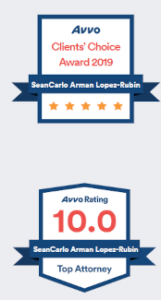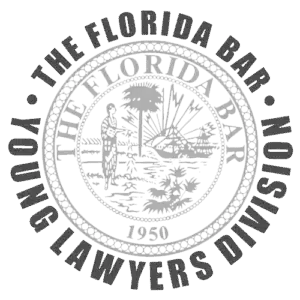St. Petersburg Temporary Restraining Order Attorney
Florida Attorneys
Serving You and The State of Florida
At Lopez Law Group, we know that if you are here, someone in your life poses an immediate threat to your safety. Whether it is an abusive partner who refuses to leave you alone, stalker appears at your home or workplace, or continuous threatening messages, our St. Petersburg temporary restraining order attorney is here to help you.
Our lawyers assist survivors through the process of obtaining temporary injunctions for protection across Florida. Our attorneys guide clients through ex parte emergency filings, evidence gathering, final hearings, and enforcement of domestic violence, dating violence, stalking, repeat violence, and sexual violence injunctions.
We work quickly to secure temporary orders that provide immediate protection while preparing cases for permanent injunctions that last indefinitely. Call (727) 933-0015 to discuss your situation and explore your legal options. Consultation fees apply for civil injunction matters.
Table of Contents
- Key Takeaways for Temporary Restraining Orders in Florida
- How Lopez Law Group Assists With Temporary Injunction Cases
- Florida’s Temporary Injunction System
- How to Get a Temporary Restraining Order in Florida
- What Happens at Final Hearings to Convert Temporary Orders
- What If the Temporary Injunction Is Violated
- FAQ for Florida Temporary Restraining Orders
- Need Emergency Protection? Contact Lopez Law Group Now
Key Takeaways for Temporary Restraining Orders in Florida
- Florida courts issue temporary ex parte injunctions the same day petitions are filed when immediate danger exists, providing protection within hours without requiring the respondent to be present or notified in advance
- Temporary injunctions typically last 15 days until final hearings occur, during which both parties present evidence, and judges decide whether to convert temporary orders into permanent injunctions
- Temporary orders can include no-contact provisions, stay-away requirements, exclusive use of shared residences, temporary custody arrangements, and firearm surrender requirements
- Service of process on respondents must be completed by law enforcement before temporary injunctions become enforceable
- Violations of temporary injunctions constitute first-degree misdemeanors carrying up to one year in jail, and survivors should call 911 immediately when violations occur to document incidents and pursue criminal charges
How Lopez Law Group Assists With Temporary Injunction Cases

Our restraining order lawyers:
- File ex parte petitions quickly to secure same-day temporary injunctions when immediate danger exists, working with court clerks in multiple Florida counties to expedite emergency filings
- Gather and organize evidence, including text messages, call logs, photographs, medical records, police reports, and witness statements that demonstrate patterns of violence or credible threats requiring immediate protection
- Represent clients at final hearings within 15 days of temporary order issuance, presenting testimony and evidence that converts temporary protection into permanent injunctions with comprehensive provisions
- Coordinate with law enforcement to ensure proper service of process, track firearm surrender compliance, and pursue criminal charges when respondents violate injunction terms
Our trauma-informed approach recognizes the difficulty of recounting frightening experiences. We work with courts to arrange safety accommodations, including separate waiting areas and remote testimony options when appropriate
Call (727) 933-0015 to schedule a consultation and begin the process of securing legal protection.
Florida’s Temporary Injunction System
Florida law provides five types of injunctions for protection, each addressing specific categories of violence or harassment. Temporary injunctions provide immediate emergency protection while cases proceed to final hearings.
Types of Florida Injunctions

Dating Violence Injunctions under Florida Statutes § 784.046 address violence between individuals in continuing romantic or intimate relationships, covering the same violent acts as domestic violence injunctions but applying to dating partners rather than family members.
Repeat Violence Injunctions protect victims subjected to two incidents of violence or stalking, with at least one incident occurring within six months of filing, applying when domestic or dating violence injunctions don’t fit because no family or romantic relationship exists.
Sexual Violence Injunctions protect victims of sexual battery, lewd or lascivious acts, luring or enticing a child, sexual performance by a child, or any forcible felony involving sexual activity, requiring only one incident with no specific relationship between parties necessary.
Stalking and Cyberstalking Injunctions under Florida Statutes § 784.0485 address willful, malicious, and repeated following, harassing, or cyberstalking causing substantial emotional distress, including electronic communication that causes substantial emotional distress and serves no legitimate purpose.
Temporary vs. Permanent Injunctions
Temporary injunctions are emergency ex parte orders issued without respondents being present or receiving advance notice. Judges review petitions and supporting evidence, then issue temporary orders that take effect immediately upon service and remain in place until final hearings occur.
Permanent injunctions result from final hearings where both parties present evidence and testimony. These injunctions have no automatic expiration date but can be changed based on circumstances.
How to Get a Temporary Restraining Order in Florida
The process of obtaining temporary injunctions involves filing petitions, presenting evidence of immediate danger, and securing emergency orders within hours.
Filing Emergency Petitions
Petitions for temporary injunctions are filed at county clerk of court offices throughout Florida. In Pinellas County, filings occur at:
- 545 First Avenue North, Room 154, St. Petersburg, FL 33701
- 315 Court Street, Room 170, Clearwater, FL 33756
- 14250 49th Street North, Clearwater, FL 33762
Many counties also accept e-filings through the Florida Courts E-Filing Portal. Filing fees do not apply to injunction petitions; the process is free, regardless of income.
What Evidence Strengthens Emergency Petitions

Evidence that strengthens emergency petitions includes:
- Text messages, emails, voicemails, and social media communications showing threats, harassment, or obsessive contact
- Photographs of injuries, property damage, or the respondent at your home or workplace
- Medical records documenting treatment for injuries caused by the respondent
- Police reports from prior incidents involving the respondent
- Witness statements from people who observed violence, threats, or stalking behavior
- Documentation of prior restraining orders or criminal cases involving the respondent
- Records showing patterns of unwanted contact including call logs, delivery receipts, and GPS tracking evidence
Petitions must describe specific incidents with dates, locations, and detailed accounts of what occurred. General allegations without supporting facts rarely result in temporary injunctions.
Same-Day Temporary Injunction Issuance
When immediate danger exists, judges review petitions the same day they’re filed and issue temporary ex parte injunctions without respondents being present. Temporary orders typically include:
- No-contact provisions prohibiting all direct and indirect communication
- Stay-away orders requiring respondents to remain specified distances from petitioners’ homes, workplaces, schools, and vehicles
- Temporary exclusive use of shared residences, requiring respondents to vacate immediately
- Temporary custody arrangements for minor children
- Firearm surrender requirements mandating respondents to turn over all firearms and ammunition to law enforcement within 24 hours of service
Temporary injunctions take effect immediately upon issuance but cannot be enforced until law enforcement serves them on respondents. Courts provide certified copies for service and schedule final hearings within 15 days.
Service of Process Requirements
Sheriff’s deputies or certified process servers must personally serve temporary injunctions on respondents before orders become enforceable. Service includes:
- Certified copy of the temporary injunction
- Copy of the petition describing allegations
- Notice of the final hearing date, time, and location
Petitions include respondent addresses and physical descriptions to facilitate service. If you don’t know the respondent’s current address, provide the last known address and any information about where they work or places they frequently visit.
Final hearings cannot proceed until service is completed. If respondents evade service, judges may extend temporary orders and issue pick-up orders authorizing law enforcement to locate and serve respondents.
What Happens at Final Hearings to Convert Temporary Orders

Final Hearing Preparation
Effective final hearing preparation requires organizing evidence, identifying witnesses, and preparing to testify about incidents described in your petition. Your restraining order attorney helps:
- Organize text messages, emails, photographs, and documents chronologically
- Prepare witnesses, including friends, family, coworkers, or neighbors who observed violence or threatening behavior
- Review your testimony to ensure you clearly describe what occurred without emotional overwhelm interfering with communication
- Anticipate respondent defenses and prepare responses to likely challenges
Burden of Proof at Final Hearings
Petitioners must prove by a preponderance of the evidence that domestic violence, dating violence, stalking, or other qualifying conduct occurred. This standard is lower than the beyond a reasonable doubt burden in criminal trials, but still requires clear and convincing evidence.
Judges will evaluate the:
- Credibility of petitioners and respondents based on demeanor, consistency, and corroboration
- Documentary evidence including text messages, photographs, and medical records
- Witness testimony from people who observed relevant incidents
- Prior history between parties including previous protective orders or criminal cases
Possible Outcomes
There are three possible outcomes at a final hearing:
Permanent injunctions granted: Judges issue final orders that remain in effect indefinitely, including no-contact provisions, stay-away requirements, custody arrangements, exclusive use of residence, firearm prohibitions, and any other provisions necessary for protection.
Petitions denied: If evidence is insufficient to meet the preponderance standard, judges deny permanent injunctions, and temporary orders expire. Petitioners lose protection and may refile if new incidents occur.
Hearings continued: Judges may continue hearings to allow additional time for service completion, evidence gathering, or witness availability, extending temporary orders until continued hearing dates.
What If the Temporary Injunction Is Violated

Some common violations of a TRO include:
- Contacting petitioners by phone, text, email, social media, or through third parties
- Appearing at petitioners’ homes, workplaces, schools, or other protected locations
- Following or surveilling petitioners
- Failing to surrender firearms as ordered
- Violating exclusive use provisions by returning to shared residences
If the respondent has violated the restraining order, you should call 911 immediately. Police will arrest respondents for violation charges, and prosecutors can pursue criminal cases separate from underlying injunction proceedings.
You should document every violation. Save any messages, photographs, incident reports, ans surveillance footage documenting the violations.
Your attorney can file motions for contempt in civil court alongside criminal violation charges, seeking additional penalties and modifications to the injunction terms addressing ongoing violations.
FAQ for Florida Temporary Restraining Orders
Do I Have to See My Abuser in Court? Are Safety Accommodations Available?
You will likely need to appear at final hearings to testify about incidents leading to your petition. However, courts can arrange safety accommodations, including separate waiting areas, staggered arrival times, bailiff escorts, and testimony via closed-circuit television in extreme cases.
Will a Temporary Injunction Protect My Children and Our Home?
Yes. Domestic and dating violence injunctions may establish temporary custody arrangements, limit or suspend the respondent’s parenting time, and grant you exclusive use of shared residences. Courts prioritize child safety and housing stability when issuing these provisions.
Can I Modify or Dissolve a Temporary or Final Injunction Later?
Either party may petition to modify or dissolve injunctions by showing changed circumstances. Petitioners have opportunities to object and explain why continued protection remains necessary. Modifications might adjust stay-away distances, visitation arrangements, or other provisions while maintaining core protections.
What if I Used a Firearm to Defend Myself Against the Respondent—Can I Still Get an Injunction?
Yes. Self-defense does not preclude obtaining injunctions for protection. If the respondent’s conduct created a reasonable fear requiring defensive force, you can still pursue injunctions prohibiting future contact.
Can I Be Sued in Civil Court if I File for an Injunction That’s Later Denied?
Filing injunction petitions in good faith based on genuine fear does not create civil liability even if courts later deny permanent orders. However, filing false or malicious petitions with intent to harass can result in sanctions or defamation claims. Always base petitions on truthful accounts of actual incidents.
Need Emergency Protection? Contact Lopez Law Group Now

SeanCarlo Lopez, St. Petersburg Temporary Restraining Order Attorney
When hours matter and waiting feels dangerous, Florida’s temporary injunction system allows survivors to obtain court-ordered protection the same day they file. Temporary orders stop contact immediately, create criminal consequences for violations, and provide the breathing room you need to plan next steps while your case moves toward a permanent solution.
Lopez Law Group files emergency ex parte petitions, working quickly to secure temporary injunctions that protect you and your children within hours of contact. Our St. Petersburg temporary restraining order attorneys represent survivors in domestic violence, dating violence, stalking, repeat violence, and sexual violence cases throughout Florida’s county court systems.
Call Lopez Law Group at (727) 933-0015 to discuss emergency filing options and begin the process of securing legal protection today. Consultation fees apply for civil injunction matters.
Lopez Law Group – Office
700 7th Ave N Suite A,
St. Petersburg, FL 33701
Ph: (866) 256-2356
Practice Areas
What Our Clients Say
A Godsend
Mr. Lopez was a Godsend and really helped me with my situation. Him and the entire firm were very diligent and helped speed the early stages of the process along due to a pressing situation. Throughout my experience working with the firm, they were always responsive and available any time I had a question or wanted to check on the state of affairs. Hopefully I won’t have to recommend Lopez Law Group to my friends or family, but if those unfortunate circumstances arise then there’s only one name I would trust. Thank you again for all your help!
Lopez Law Group Can See You Through Cases Like:
Don't See What You Need?
Lopez Law Group
700 7th Ave N, Suite A,
St. Petersburg, FL 33701
P: 727-933-0015
Business Hours
Mo, Tu, We, Th, Fr
Schedule a Call Back
Book a Consultation






















